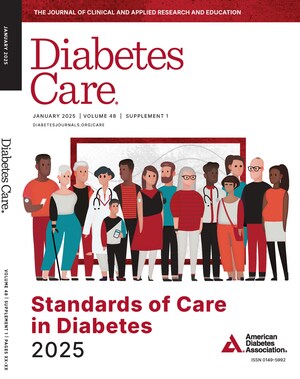NEW ORLEANS, June 14, 2016 /PRNewswire-USNewswire/ -- Pioglitazone greatly decreases the risk of developing type 2 diabetes, especially for those who already have prediabetes and/or who have had strokes, according to a study presented at the American Diabetes Association's 76th Scientific Sessions® at the Ernest N. Morial Convention Center in New Orleans.
The Insulin Resistance Intervention after Stroke trial (IRIS)[1] recently found that the thiazolidinedione (TZD) drug, pioglitazone, reduced the risk of fatal and non-fatal stroke and myocardial infarction (heart attack) by 24 percent, in people with cerebrovascular disease—a group of conditions that affects the flow of blood to the brain. This secondary analysis of the data collected in the IRIS trial examined pioglitazone's effect on diabetes prevention in a large group of non-diabetic stroke patients with insulin resistance, including many people who had prediabetes. The analysis found that pioglitazone reduced progression to diabetes by 52 percent.
"While previous studies have shown that TZD medications can reduce diabetes risk, this is the first to show they can do so in a group of patients with established cardiovascular disease. It's also the first time a glucose-lowering drug has been shown to both reduce diabetes and also reduce the risk of cardiovascular complications in the same study," said lead investigator Silvio E. Inzucchi, MD, Director of the Yale Diabetes Center.
"Insulin resistance is very common after stroke," he said. "Treating insulin resistance with pioglitazone cuts the risk of diabetes in half, while also reducing the risk of stroke and heart attack by one-quarter. This is a potentially powerful dual effect to combat metabolic and cardiovascular disease."
The IRIS trial included 3,876 patients who recently had a stroke or heart attack, insulin resistance (defined as Homeostasis Model Assessment of Insulin Resistance >3.0) and who did not have diabetes (defined as no prior history and fasting plasma glucose of <126 mg/dl). They were randomly assigned to pioglitazone (45 mg QD) (n=1,939) or placebo (n=1,937). At baseline, patients exhibited mean fasting plasma glucose levels (FPG) of 98.2 mg/dl, A1C of 5.8 percent and Homeostasis Model Assessment of Insulin Resistance (HOMA-IR) of 5.4. They were assessed annually through interviews and FPG testing. After the first year, mean HOMA-IR dropped to 4.1 in the pioglitazone group and increased to 5.7 in the placebo group (p<0.0001), while FPG decreased to 95.1 mg/dl in the pioglitazone group and increased to 99.7 mg/dl in the placebo group (p<0.0001). During 4.8 years of follow up, 73 (3.8 percent) patients in the pioglitazone group developed type 2 diabetes, compared to 149 (7.7 percent) in the placebo group (HR 0.48; 95% CI 0.33, 0.69; p<0.0001).
The greatest reduction in risk occurred in patients who had prediabetes (FPG greater than or equal to 100 mg/dl, or A1C greater than or equal to 5.7 percent) and those who had the worst insulin resistance (HOMA-IR greater than or equal to 4.6). For those two groups of patients, absolute risk reduction (ARR) was 8.5 percent, compared to 0.8 percent (for those with FPG less than 100 mg/dl); 5.6 percent, compared to 1 percent (for those with A1C less than 5.7 percent); and 6.3 percent, compared to 1.4 percent (for those with HOMA-IR less than 4.6), respectively.
The American Diabetes Association's 76th Scientific Sessions, to be held June 10-14, 2016, at the Ernest N. Morial Convention Center in New Orleans, is the world's largest scientific meeting focused on diabetes. The 2016 Scientific Sessions is expected to attract more than 16,000 attendees and offers researchers and health care professionals from around the world the opportunity to share ideas and learn about the significant advances in diabetes research, treatment and care. During the five-day meeting, attendees receive exclusive access to more than 2,500 original research presentations, participate in provocative and engaging exchanges with leading diabetes experts, and can earn Continuing Medical Education (CME) or Continuing Education (CE) credits for educational sessions. The program is grouped into eight theme areas: Acute and Chronic Complications; Behavioral Medicine, Clinical Nutrition, Education and Exercise; Clinical Diabetes/Therapeutics; Epidemiology/Genetics; Immunology/Transplantation; Insulin Action/Molecular Metabolism; Integrated Physiology/Obesity; and Islet Biology/Insulin Secretion. Margaret A. Powers, PhD, RD, CDE, President, Health Care & Education, will deliver her address on Saturday, June 11, and Desmond Schatz, MD, President, Medicine & Science, will present his address on Sunday, June 12. The top eight abstracts of this year's Scientific Sessions will be presented on Tuesday, June 14, in the Presidents Oral Session. In total, the 2016 Scientific Sessions includes 378 abstracts in 50 oral sessions, 2,021 poster presentations including 59 moderated poster discussions, and 335 published-only abstracts. The Association's 2016 Scientific Achievement Awards and Lectures are:
- Barbara B. Kahn, MD, Banting Medal for Scientific Achievement, the Association's highest honor. Kahn will deliver the Banting Medal Lecture, "Adipose Tissue, Inter-organ Communication, and the Path to T2D," on Sunday, June 12.
- Tamas L. Horvath, DVM, PhD, Outstanding Scientific Achievement Award (OSAA), will present his OSAA Lecture, "Hunger-promoting Hypothalamic Neurons Control System Metabolism and Drive Complex Behaviors and Longevity," on Monday, June 13.
- Sheri R. Colberg-Ochs, PhD, FACSM, Outstanding Diabetes Educator, will present her Lecture, "From Froot Loops® to Fitness—My Journey as an Educator and PWD," on Saturday, June 11.
- Edward W. Gregg, PhD, Kelly West Award for Outstanding Achievement in Epidemiology, will deliver his Lecture, "The Changing Tides of the Diabetes Epidemic—Smooth Sailing or Troubled Waters Ahead?," on Sunday, June 12.
Additional scientific research will be presented during 110 Symposia and nine Professional Interest Group sessions. The 76th Scientific Sessions also includes presence from more than 130 corporate and organizational exhibitors in nearly 100,000 square feet of exhibit space. Join the Scientific Sessions conversation on Twitter, #2016ADA.
About the American Diabetes Association
The American Diabetes Association is leading the fight to Stop Diabetes® and its deadly consequences and fighting for those affected by diabetes. The Association funds research to prevent, cure and manage diabetes; delivers services to hundreds of communities; provides objective and credible information; and gives voice to those denied their rights because of diabetes. Founded in 1940, the Association's mission is to prevent and cure diabetes, and to improve the lives of all people affected by diabetes. For more information, please call the American Diabetes Association at 1-800-DIABETES (1-800-342-2383) or visit diabetes.org. Information from both of these sources is available in English and Spanish. Find us on Facebook (American Diabetes Association), Twitter (@AmDiabetesAssn) and Instagram (@AmDiabetesAssn).
76th Scientific Sessions
News Briefing: Diabetes Prevention and Improved Management, Monday, June 13, 10:30 a.m. CT
Oral Presentation: ADA Presidents Oral Session
Poster Presentation: Great Hall B
Session Time: Tuesday, June 14, 2016, 10:15 a.m.–12:15 p.m.
380-OR Diabetes Prevention with Pioglitazone in Insulin Resistant Patients with Cerebrovascular Disease
SILVIO E. INZUCCHI, CATHERINE M. VISCOLI, LAWRENCE H. YOUNG, KAREN L. FURIE, MARK GORMAN, ANNE LOVEJOY, GREGORY G. SCHWARTZ, WALTER N. KERNAN, New Haven, CT, Providence, RI, Burlington, VT, Denver, CO
The Insulin Resistance Intervention after Stroke (IRIS) trial recently found that the thiazolidinedione drug, pioglitazone, reduced the risk of the primary composite outcome of fatal and non-fatal stroke or myocardial infarction, as well as the secondary outcome of progression to diabetes, in insulin resistant patients with cerebrovascular disease. This report analyzes pioglitazone's effect on key glycemic parameters and on diabetes prevention within clinically relevant subgroups. 3876 non-diabetic patients (no prior history and fasting plasma glucose [FPG] <126 mg/dl) with recent ischemic stroke or transient ischemic attack and insulin resistance by the Homeostasis Model Assessment of Insulin Resistance (HOMA-IR >3.0) were randomly assigned to pioglitazone 45 mg QD vs. placebo. Surveillance for diabetes onset was by annual interview and FPG testing. At baseline, mean FPG, HbA1c, insulin, and HOMA-IR were 98.2 mg/dL, 5.8%, 22.4 uIU/ml, and 5.4, respectively. After 1 year, mean HOMA-IR decreased to 4.1 in the pioglitazone group and increased to 5.7 in the placebo group (p<0.0001); the corresponding 1-year FPG values were 95.1 and 99.7 mg/dl, respectively (p<0.0001). During 4.8 years, diabetes developed in 73 (3.8%) patients in the pioglitazone group vs. 149 (7.7%) patients in the placebo group (HR 0.48; 95% CI 0.33, 0.69; p<0.0001). The absolute risk reduction (ARR) was greatest for patients with FPG ≥100 mg/dl vs. <100 mg/dL (ARR 8.5% vs. 0.8%), HbA1c ≥5.7% vs. <5.7% (ARR 5.6% vs. 1.0%), and HOMA-IR ≥4.6 vs <4.6 (ARR 6.3% vs. 1.4%). Among insulin resistant but non-diabetic patients with cerebrovascular disease, pioglitazone decreases the risk of diabetes, especially in those with prediabetes (i.e., impaired fasting glucose or increased HbA1c) and worse insulin resistance. Pioglitazone is therefore the first glucose-lowering drug to prevent both progression to diabetes and major cardiovascular events as prespecified outcomes in a single trial.
Author Disclosure Block:
S.E. Inzucchi: Advisory Panel; Author; Boehringer Ingelheim Pharmaceuticals, Inc., Novo Nordisk A/S, Intarcia Therapeutics, Inc., Merck & Co., Inc, Lexicon Pharmaceuticals, Inc., Daiichi-Sankyo Co., Ltd., Poxel Pharmaceutical Company. Consultant; Author; AstraZeneca, Sanofi U.S.. Other Relationship; Author; Takeda Pharmaceutical Company Limited. C.M. Viscoli: None. L.H. Young: Research Support; Author; Merck & Co., Inc, Mifcor. K.L. Furie: None. M. Gorman: None. A. Lovejoy: None. G.G. Schwartz: Research Support; Author; Cerenis Therapeutics Inc., Roche Pharmaceuticals, Sanofi U.S., The Medicines Company, Reseverlogix. W.N. Kernan: Research Support; Author; Takeda Pharmaceutical Company Limited.
[1] Kernan WN, Viscoli CM, Furie, KL, et al. Pioglitazone after ischemic stroke or transient ischemic attack. N Engl J Med 2016; 374:1321-1331
Logo - http://photos.prnewswire.com/prnh/20141105/156803LOGO
SOURCE American Diabetes Association
Related Links
WANT YOUR COMPANY'S NEWS FEATURED ON PRNEWSWIRE.COM?
Newsrooms &
Influencers
Digital Media
Outlets
Journalists
Opted In





Share this article